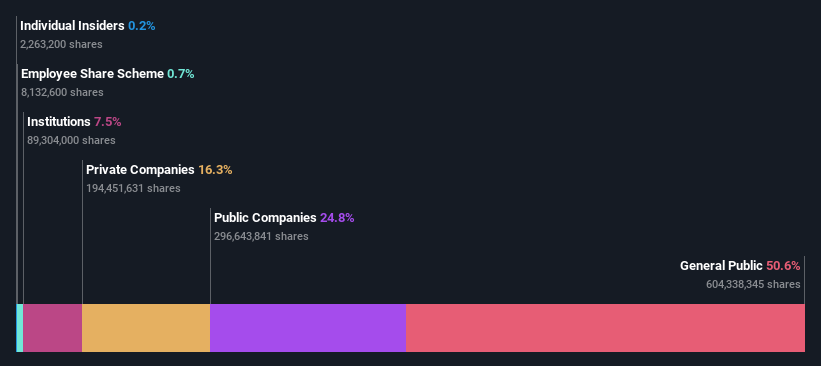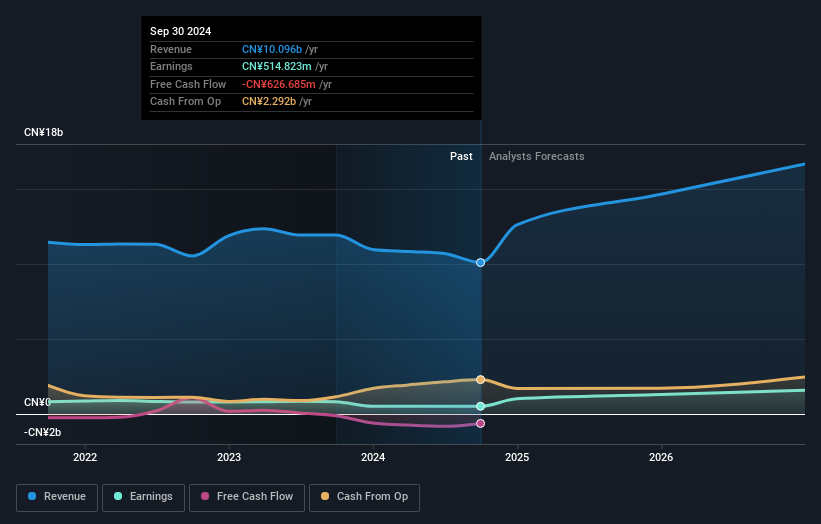Individual investors account for 51% of Fujian Longking Co., Ltd.'s (SHSE:600388) ownership, while public companies account for 25%

Key Insights
- The considerable ownership by individual investors in Fujian Longking indicates that they collectively have a greater say in management and business strategy
- The top 25 shareholders own 49% of the company
- Ownership research along with analyst forecasts data help provide a good understanding of opportunities in a stock
A look at the shareholders of Fujian Longking Co., Ltd. (SHSE:600388) can tell us which group is most powerful. We can see that individual investors own the lion's share in the company with 51% ownership. Put another way, the group faces the maximum upside potential (or downside risk).
And public companies on the other hand have a 25% ownership in the company.
Let's take a closer look to see what the different types of shareholders can tell us about Fujian Longking.
Check out our latest analysis for Fujian Longking

What Does The Institutional Ownership Tell Us About Fujian Longking?
Many institutions measure their performance against an index that approximates the local market. So they usually pay more attention to companies that are included in major indices.
We can see that Fujian Longking does have institutional investors; and they hold a good portion of the company's stock. This implies the analysts working for those institutions have looked at the stock and they like it. But just like anyone else, they could be wrong. When multiple institutions own a stock, there's always a risk that they are in a 'crowded trade'. When such a trade goes wrong, multiple parties may compete to sell stock fast. This risk is higher in a company without a history of growth. You can see Fujian Longking's historic earnings and revenue below, but keep in mind there's always more to the story.

Hedge funds don't have many shares in Fujian Longking. Our data shows that Zijin Mining Group Company Limited is the largest shareholder with 25% of shares outstanding. With 8.4% and 5.6% of the shares outstanding respectively, Longyan State-Owned Assets Investment Management Co. Ltd. and Yango Financial Holding Investment Group Co., Ltd. are the second and third largest shareholders.
Our studies suggest that the top 25 shareholders collectively control less than half of the company's shares, meaning that the company's shares are widely disseminated and there is no dominant shareholder.
While it makes sense to study institutional ownership data for a company, it also makes sense to study analyst sentiments to know which way the wind is blowing. There are a reasonable number of analysts covering the stock, so it might be useful to find out their aggregate view on the future.
Insider Ownership Of Fujian Longking
The definition of company insiders can be subjective and does vary between jurisdictions. Our data reflects individual insiders, capturing board members at the very least. Management ultimately answers to the board. However, it is not uncommon for managers to be executive board members, especially if they are a founder or the CEO.
I generally consider insider ownership to be a good thing. However, on some occasions it makes it more difficult for other shareholders to hold the board accountable for decisions.
Our data suggests that insiders own under 1% of Fujian Longking Co., Ltd. in their own names. We do note, however, it is possible insiders have an indirect interest through a private company or other corporate structure. It's a big company, so even a small proportional interest can create alignment between the board and shareholders. In this case insiders own CN¥29m worth of shares. Arguably, recent buying and selling is just as important to consider. You can click here to see if insiders have been buying or selling.
General Public Ownership
The general public -- including retail investors -- own 51% of Fujian Longking. This size of ownership gives investors from the general public some collective power. They can and probably do influence decisions on executive compensation, dividend policies and proposed business acquisitions.
Private Company Ownership
It seems that Private Companies own 16%, of the Fujian Longking stock. It's hard to draw any conclusions from this fact alone, so its worth looking into who owns those private companies. Sometimes insiders or other related parties have an interest in shares in a public company through a separate private company.
Public Company Ownership
Public companies currently own 25% of Fujian Longking stock. This may be a strategic interest and the two companies may have related business interests. It could be that they have de-merged. This holding is probably worth investigating further.
Next Steps:
It's always worth thinking about the different groups who own shares in a company. But to understand Fujian Longking better, we need to consider many other factors. Case in point: We've spotted 4 warning signs for Fujian Longking you should be aware of.
Ultimately the future is most important. You can access this free report on analyst forecasts for the company.
NB: Figures in this article are calculated using data from the last twelve months, which refer to the 12-month period ending on the last date of the month the financial statement is dated. This may not be consistent with full year annual report figures.
New: AI Stock Screener & Alerts
Our new AI Stock Screener scans the market every day to uncover opportunities.
• Dividend Powerhouses (3%+ Yield)
• Undervalued Small Caps with Insider Buying
• High growth Tech and AI Companies
Or build your own from over 50 metrics.
Have feedback on this article? Concerned about the content? Get in touch with us directly. Alternatively, email editorial-team (at) simplywallst.com.
This article by Simply Wall St is general in nature. We provide commentary based on historical data and analyst forecasts only using an unbiased methodology and our articles are not intended to be financial advice. It does not constitute a recommendation to buy or sell any stock, and does not take account of your objectives, or your financial situation. We aim to bring you long-term focused analysis driven by fundamental data. Note that our analysis may not factor in the latest price-sensitive company announcements or qualitative material. Simply Wall St has no position in any stocks mentioned.
About SHSE:600388
Fujian Longking
Engages in the manufacture and sale of environmental protection equipment worldwide.
Flawless balance sheet, undervalued and pays a dividend.
Market Insights
Community Narratives



